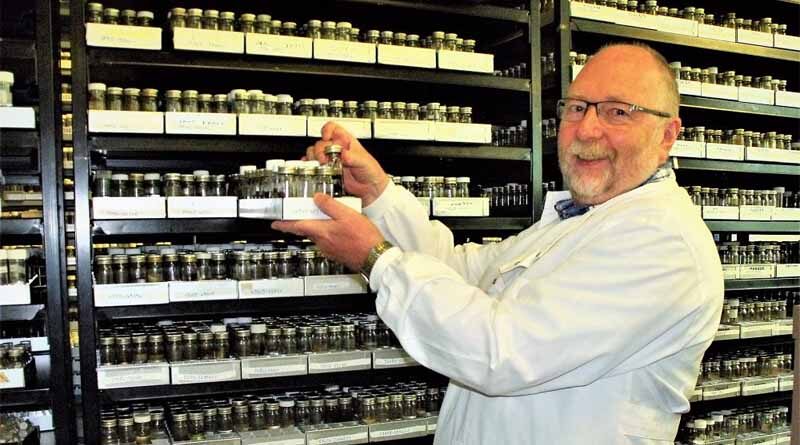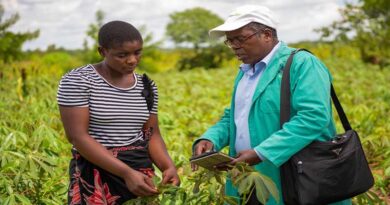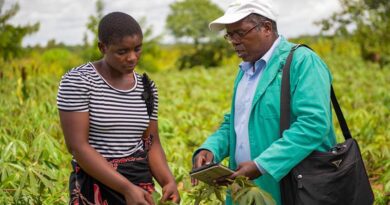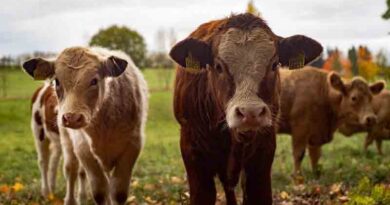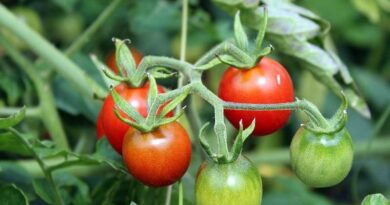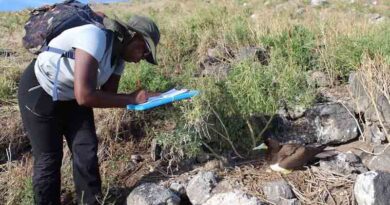Review highlights a century of science in tackling emerging fungal diseases in response to climate change
12 January 2023, Africa: A new CABI-led review published in the journal Microbiology Australia highlights how CABI has spent over 100 years identifying and combatting emerging fungal diseases of plants in response to the impacts of climate change.
Dr David Smith, Emeritus Fellow and former Director, Biological Resources at CABI, led a team of scientists who focused on how climate change is influencing disease occurrence and how CABI’s work and resources can help in the battle to help reduce them.
Ultimately, the researchers highlight how CABI and its 49 Member Countries are working collaboratively with a global network of partners to manage emerging and spreading diseases which can affect livelihoods and impact upon food security.
This includes diseases such as Maize Lethal Necrosis Disease (MLND) which has been negatively affecting maize crops and their seeds in eastern and central Africa. Part of CABI’s work to help mitigate this included a project that sought to enhance the knowledge base on MLND viruses and the epidemiology of the disease in the affected countries.
A key component of CABI’s work in the field is its living culture collection. This was born from the establishment of the Imperial Bureau of Mycology in 1920 and laid the foundation of CABI’s expertise in mycology which continues to this day.
Currently there are over 30,000 strains of fungi and bacteria – including 5,000 plant pathogens and other microorganisms – in the collection of which 90% are unique to CABI. It represents one of the world’s largest genetic resource collections and holds the UK’s National Collection of Fungus Cultures.
Another aspect of CABI’s work is its Diagnostic and Advisory Service (DAS) which provides diagnostic advice on pests and diseases on crops from around the world. An example of this was the confirmation of the invasive apple snail (Pomacea canaliculate) – which threatens Kenya’s rice crops – using DNA analysis.
In addition to sequencing, techniques such as MALDI-TOF (matrix-assisted laser desorption ionisation – time of flight analysis) are used are used to identify and characterise disease causing microorganisms.
Other recent new country reports of pests and diseases confirmed by the DAS laboratory include Moniliophthora roreri causing frosty pod rot on cocoa in Jamaica and the fall armyworm (Spodoptera frugiperda) which affects more than 100 plant species and is found in Africa and Asia.
Dr Smith said, “An understanding of microbes and microbial communities is essential for improving crop yields and facilitating interventions, such as biocontrol of pests, diseases, and invasive species.
“In parallel to the scientific work, CABI information resources are supporting the science and fieldwork to increase the reach, application, and understanding of the science worldwide.”
“In carrying out its work, CABI has seen an impact on emerging disease due to climate change and has implemented programmes to help farmers adapt to its impact.”
These programmes include the global PlantwisePlus programme which works closely with national agricultural advisory services to establish a global network of plant clinics, run by trained ‘plant doctors.’
Rural plant clinics, staffed by agricultural advisors trained through PlantwisePlus, receive diseased samples and provide a timely diagnosis and appropriate remedial advice.
The programme has been introduced to 34 countries in Africa, Asia and the Americas, presented over 5,000 plant clinics, trained over 13, 200 plant doctors and reached over 54 million smallholder farmers.
Recommendations to farmers have resulted in halving the use of restricted chemicals, increasing yields by more than 20% and over 1.5 million farmers have improved food security.
Another programme is the Pest Risk Information Service (PRISE) which, in sub-Saharan Africa, used earth observation environmental data and models on pest life cycles to create early-warning alerts and advice to farmers on the timely application of pest control products.
It has delivered pest alerts in Kenya, Ghana, Zambia and Malawi to over 1.8 million farmers since it began in 2017. SMS information was sent to 6,000 farmers in Kenya, for example, on the fall armyworm which resulted in 60% of the farmers reporting a change in their farming practices as a result.
Dr Smith added, “It is clear that climate change exacerbates problems and broadens the scope and range of plant pests and invasive species by enabling organisms to grow in environments from which they have normally been excluded.”
“Predictive models and early warning systems are needed if we are to combat such problems, for which CABI’s information resources and dissemination systems can play a critical role.”
A CABI-led review in the Journal of Economic Entomology has already highlighted several management options for the fall armyworm after recent climatic models reveal that the pest is likely to itself in the southern parts of Europe including southern Spain, Italy, Portugal or Greece.
Also Read: Garuda Aerospace signs MoU with Rallis India
(For Latest Agriculture News & Updates, follow Krishak Jagat on Google News)

